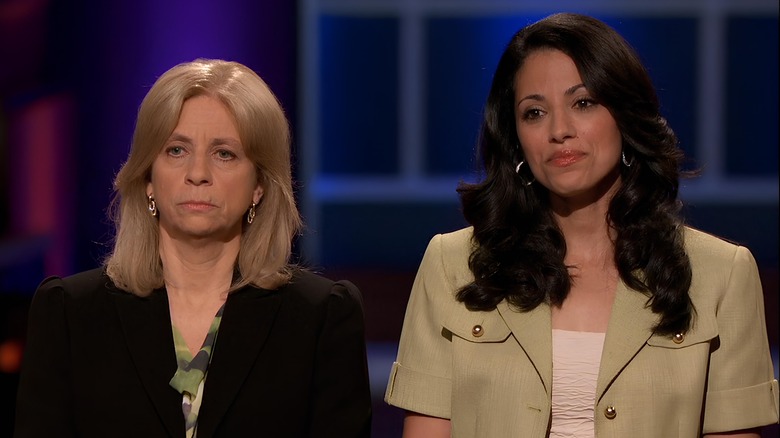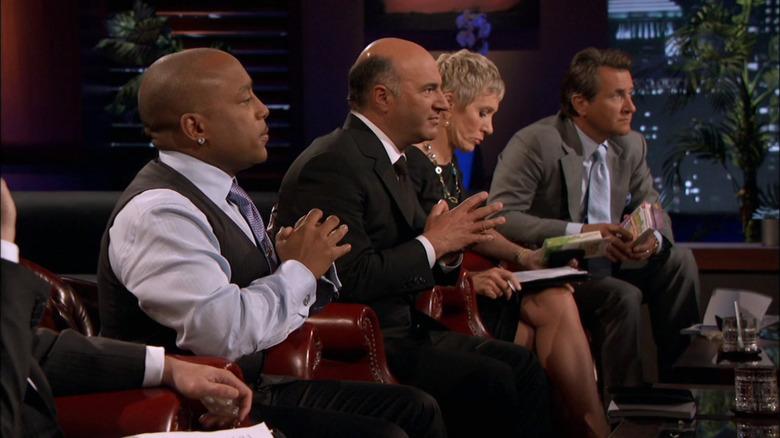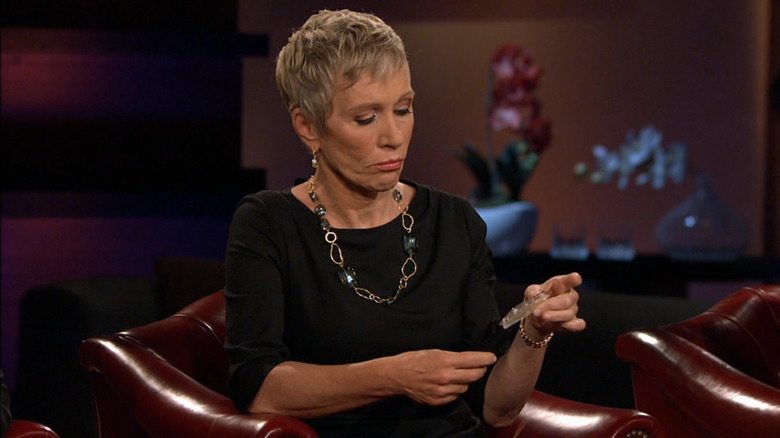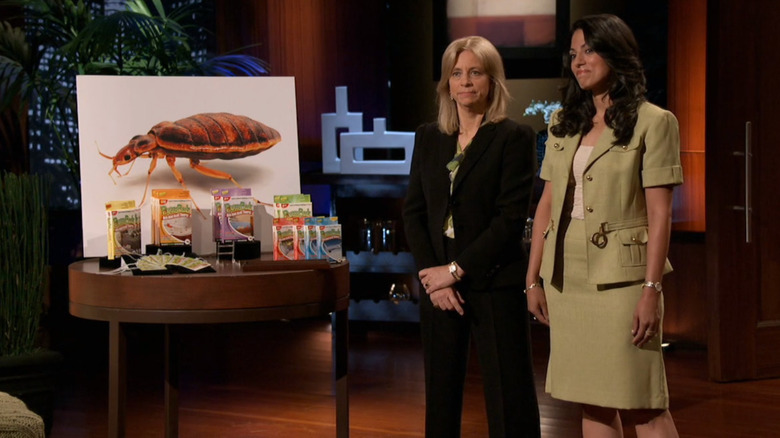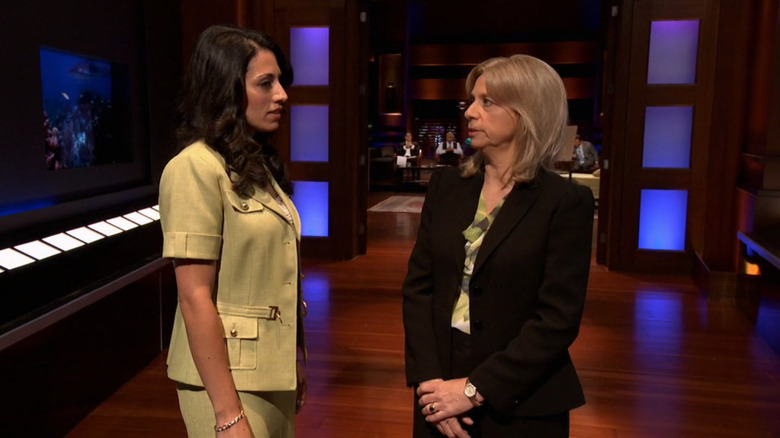Whatever Happened To BuggyBeds After Shark Tank?
We may receive a commission on purchases made from links.
Anyone who has ever dealt with the scourge of bed bugs knows that they're an especially formidable pest. There are, to begin with, the itchy, unattractive welts that they leave behind. Then there's the imposing task of removal, which involves washing just about every bit of fabric you own. Bed bugs also possess a uniquely disgusting ick factor, seeing as hundreds at a time can take up residence in your bed.
While methods for bed bug removal exist, entrepreneurs Veronica Perlongo and Maria Curcio noticed that there wasn't an effective product on the market for bed bug detection. By the time you notice the line of bites along your wrists or ankles, after all, it is already too late. That observation was the spark for BuggyBeds, a device that monitors the presence of bed bugs via four small glue traps that slide under the corners of a mattress. Curcio developed the business following a car accident that led to her spending four years recovering in rehab. "I started tinkering from my bed," she told Shark Tank Blog.
Perlongo and Curcio launched BuggyBeds in 2012, and it only took a few months to secure a coveted spot on "Shark Tank," though not because of their own efforts. "We didn't audition for the show," Curcio continued. "The producers approached us. At first, we said 'No,' but when they asked us a second time, we decided to appear."
An unprecedented five-shark deal
Veronica Perlongo and Maria Curcio shot their Season 4 episode of "Shark Tank" in the summer of 2012 leading up to its premiere in September. At the time of filming, BuggyBeds was only six months old, but it had already netted $150,000 in sales with a $100,000 profit margin. During their episode, Perlongo and Curcio enter the tank seeking $125,000 for 7% equity in BuggyBeds, and they already have an idea of how it's like turning down offers; the pair had already dismissed a $5 million deal for the company's trademarks and patents, a move that made the sharks' jaws drop. For her hardline business dealings, Curcio had earned the nickname "Mrs. Wonderful."
Upon hearing BuggyBeds' numbers, the sharks practically foam at the mouth to begin negotiating. To keep the feeding frenzy at bay, Kevin O'Leary dismisses the entrepreneurs and suggestes that the sharks offer a joint deal of $250,000 for 25% equity. Daymond John quickly hops aboard, quipping, "I'm itching to do this deal," and Robert Herjavec joins soon after.
Barbara Corcoran attempts to add her own deal to the mix — for $150,000 for 15% — but pulls out when Perlongo and Curcio hesitate. After doing some hesitating of his own, Mark Cuban enters the mammoth deal, with Corcoran ultimately accepting the deal with her four co-sharks. Left with no room to negotiate, the BuggyBed founders accept the deal, and Curcio gives a triumphant fist pump on her way out. The five-way split was unprecedented and has since only happened a few times in the series' 14-year existence.
Not all of the sharks were happy with the BuggyBeds deal
Once the cameras are off, "Shark Tank" investors often change the terms of their deals, with some deals never coming to fruition at all. It's remarkable, then, that five sharks were able to pull off their giant BuggyBeds deal. Some sharks, however, weren't entirely happy with how the deal shook out.
"I actually wasn't a big fan of the deal," Mark Cuban admitted to Forbes in 2012. But I did feel like it had potential." Mr. Wonderful, ever the risk-taker, was willing to roll the dice if it meant securing a deal. "I wanted to avoid price escalation so I was willing to take a lesser [percentage] of the deal at a better price. I pushed for shark collusion," he explained. "In this case it worked out and I think it's the first time all the sharks cooperated on a deal in years."
Barbara Corcoran, meanwhile, revealed that she felt peer-pressured to join in. "I just didn't get that business and I didn't want to play. The guys shamed me into it, and I won't fall for the 'team spirit' thing again," she said. "I also thought the entrepreneur pitching was a great salesperson, but my gut just didn't believe her. Lesson learned again: trust your gut."
Corcoran may have wanted out, but her bank account would probably say otherwise; BuggyBeds has gone on to thrive, with GREY Journal dubbing it one of the most successful "Shark Tank" products of all time alongside Squatty Potty and Scrub Daddy.
BuggyBeds has expanded rapidly since 2012
BuggyBeds was already a hit upon appearing on "Shark Tank," and the five-shark boost — as well as some free "Shark Tank" publicity — skyrocketed the product to even greater heights. In particular, Veronica Perlongo and Maria Curcio agreed to go on "Shark Tank" in order to find help with retail distribution and access to big box stores. Indeed, O'Leary touted his Walmart connections, and John did the same for 7-Eleven.
"We felt the sharks could add value as far as tapping into their distribution networks," Curcio told Shark Tank Blog. "We want BuggyBeds to be a worldwide brand. Daymond's team has taken the lead, but all the sharks have been great."
The business owners have been successful in that regard. Upon appearing on "Shark Tank," Perlongo and Curcio had already secured deals with Home Depot and Burlington Coat Factory. In the aftermath of their TV appearance, Curcio continued, "We've had four label printers running for six days straight and we can't keep up with the order volume."
Now, BuggyBeds are available at 350 Home Depot locations — a massive bump from the 60 stores in 2012 — as well as all Burlington locations. The devices also retail at CVS, ACE, Do It Best, Camping World, Kroger, Meijer, Fred Meyer, Harris Teeter, and Target, among other locations. Another huge market for BuggyBeds is hotels and property management companies.
What's next for BuggyBeds?
BuggyBeds' upward trajectory is showing no signs of slowing, thanks in part to their expanded line of pest-fighting products. In addition to their bed bug detector, BuggyBeds now sells mosquito repellent bands, bed bug luggage liners, and insect repellent spray, the prices of which range from $4.99 and $24.98 on their website as of this writing.
The BuggyBeds' products are hugely popular on Amazon, and consumers have bought over 200 packs of the original glue traps in the past month. On the online retailer, the detectors have earned a 3.5-star review based on over 450 reviews. That said, some of the one-star reviews seem to be from consumers who mistakenly thought the product eradicates bed bugs entirely.
According to reviews, BuggyBeds seems especially popular among frequent travelers hoping to avoid bed bug-infested hotels, as well as Airbnb hosts. "I use them in my AirBnb space under the mattresses to be sure that l don't develop a problem with bed bugs with guests coming and going. It's an insurance policy," reads one review. "My friend travels with them and doesn't unpack her bags until the hotel bed passes the test."
With reviews posted as recently as September 2023, BuggyBeds is still finding new customers after more than a decade, and they're grossing about $4 million annually.
